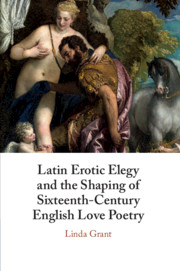Book contents
- Latin Erotic Elegy and the Shaping of Sixteenth-Century English Love Poetry
- Latin Erotic Elegy and the Shaping of Sixteenth-Century English Love Poetry
- Copyright page
- Contents
- Textual Note
- Introduction
- Chapter 1 ‘Ovid Was There and with Him Were Catullus, Propertius and Tibullus’
- Chapter 2 ‘For Truth and Faith in Her Is Laid Apart’
- Chapter 3 ‘“Fool,” Said My Muse to Me’
- Chapter 4 ‘In Six Numbers Let My Work Rise, and Subside in Five’
- Chapter 5 ‘My Heart … with Love Did Inly Burn’
- Conclusion
- Notes
- Bibliography
- Index
Conclusion
‘And Love Doth Hold My Hand and Makes Me Write’
Published online by Cambridge University Press: 19 August 2019
- Latin Erotic Elegy and the Shaping of Sixteenth-Century English Love Poetry
- Latin Erotic Elegy and the Shaping of Sixteenth-Century English Love Poetry
- Copyright page
- Contents
- Textual Note
- Introduction
- Chapter 1 ‘Ovid Was There and with Him Were Catullus, Propertius and Tibullus’
- Chapter 2 ‘For Truth and Faith in Her Is Laid Apart’
- Chapter 3 ‘“Fool,” Said My Muse to Me’
- Chapter 4 ‘In Six Numbers Let My Work Rise, and Subside in Five’
- Chapter 5 ‘My Heart … with Love Did Inly Burn’
- Conclusion
- Notes
- Bibliography
- Index
Summary
The conclusion summarises how we have traced the complex and diverse ways that elegy is renewed in sixteenth century England. Rather than confirming Thomas Greene’s reception narrative of loss and melancholy, we have seen an exuberant, creative and productive set of intertextual practices that take elegy as their source but re-shape it to articulate the various preoccupations of sixteenth century poetry. I summarise here the ideas, tonalities and voices that elegy enables that Petrarchism does not, and the way its irreverant, sceptical, sexually explicit nature challenges the qualities that might be deemed ‘literary’, making them legitimate and available to Renaissance poets, even if not always respectable. The importance of hybridised intertexts is discussed and, by linking this phenomenon back to the teaching by common-place books discussed in Chapter 1, I suggest that reception methodology needs to be historicised, as it is here, moving from a one-to-one linear relationship to something closer to a network of intertexts. The chapter ends with discussing the value of reading the erotic, and the negotiations required by female poets, before pointing forward to future work.
Keywords
- Type
- Chapter
- Information
- Latin Erotic Elegy and the Shaping of Sixteenth-Century English Love PoetryLascivious Poets, pp. 189 - 196Publisher: Cambridge University PressPrint publication year: 2019

